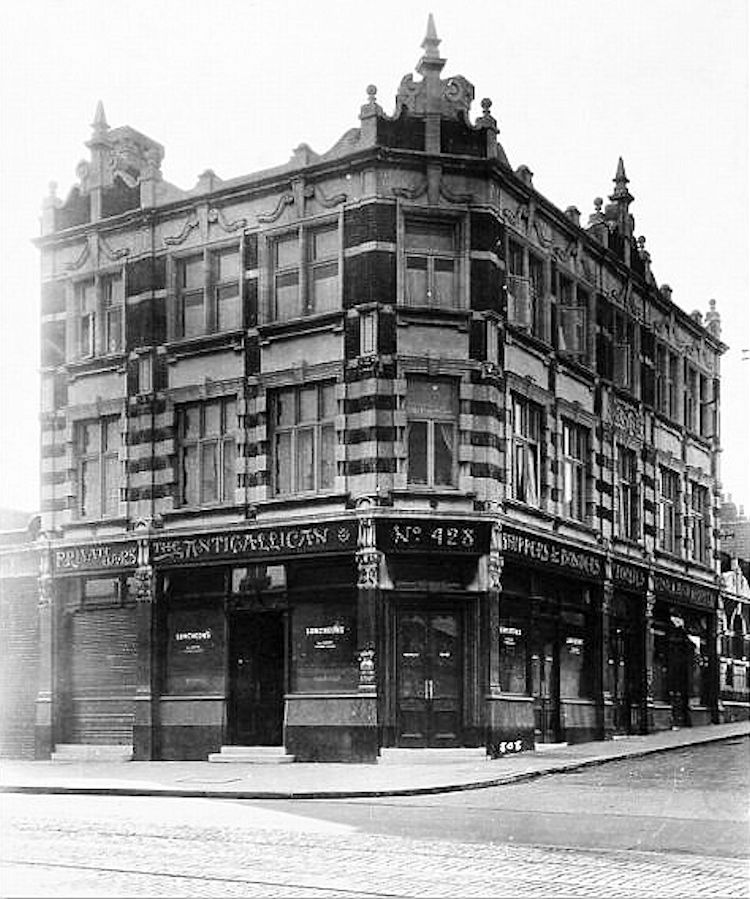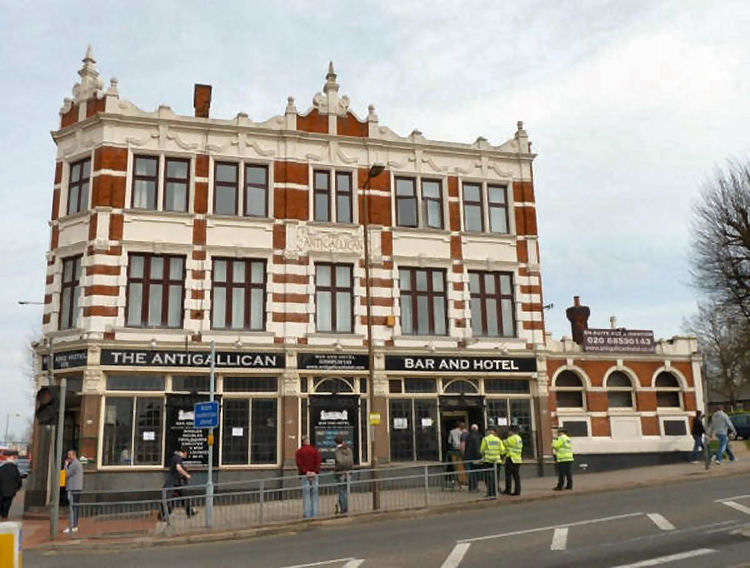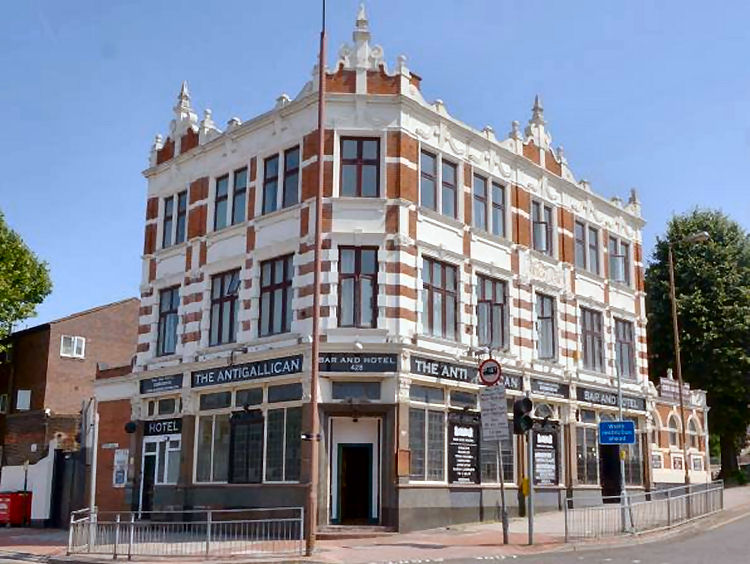|
Kentish Gazette, 7 February, 1792.
About 10 o'clock at night on Sunday the 29th ult. a most daring
robbery was committed at a small public house,
on the Woolwich Road, known by the sign of the "Antigallican,"
adjoining Hanging Wood, by 10 desperate
villains, who, entering the door, bound the master and mistress, and
all the servants, with two men who were
drinking in the house.
They then began to ransack the house of linen and cash to the amount
of £60 - afterwards sat down and drank,
and smoke their pipes till 3 o'clock in the morning, and then took
their leave.
It is to be observed that two brewers servants on duty, were passing
by at 11 o'clock, saw a light in the house,
and knocked at the door, whom the desperadoes let in, seized and
confined them also.
They were seen going afterwards to the waterside, where a boat was
ready to receive them, in which they
affected their escape.
|
|
The Evening Freeman, Tuesday 20 December 1864.
THE FATAL COLLISION IN A TUNNEL.
The collision in the Blackheath tunnel, on the North Kent Railway, on
Friday, was a most disastrous occurrence. A ballast train had entered
the tunnel, and shortly afterwards it was followed by a passenger train
from Maidstone, but before it had passed through, the ballast train was
overtaken by the latter, and five of the platelayers who were seated in
the last of the ballast trucks were killed. The effect of the collision
on the passenger train was to throw the engine off the line and upon its
side, and inflict injuries upon the passengers in the two leading
carriages of the train. The engine and tender were thrown over on their
sides, literally filling up the whole of the "way," and the break-van
immediately following the engine, together with the first two carriages,
were capsized and nearly shivered to atoms. The smoke, steam, and
cinders blown about by the current of air through the tunnel, the
shrieks of the injured and frightened, and the cracking up of the
timbers of the carriages, combined to make up what one of the passengers
described as a scene "awful in the extreme."
Immediately on hearing the
shrieks from the Charlton end of the tunnel, the telegraph was put into
requisition, and the traffic was stopped from Blackheath Station on the
one side and Charlton on the other.
As soon as possible a number of
workmen and officials of the company entered the tunnel at either end,
and upon Mr. Chapman, the Blackheath station-master, arriving about a
mile down the tunnel he came upon a most horrible scene. The ballast
trucks and their contents had been thrown into violent confusion, and
amongst the debris were found the mangled remains of the unfortunate men
who had been engaged upon the trucks. Five of them were dead, and their
mangled corpses were placed on pieces of broken trucks and conveyed
through the dreary tunnel to an outbuilding at Blackheath Station. The
engine, as before stated, lay across the tunnel, and the carriages
forming the front part of the train were all pell mell on each other,
the front being broken to pieces.
From the wreck eight male and six
female passengers were removed very much injured. A large number of
passengers who were only shaken and contused were rescued from all
descriptions of perilous positions. Two ambulances, with a detachment of
the Military Train corps, were forwarded from Woolwich Garrison, and a
body of police were soon on the spot. The sufferers were conveyed down
the line to the Charlton station, and from thence on beds and stretchers
to the "Antigallican Arms Tavern." Seven of the most injured, four of
whom are females, were placed under the care of Dr. Fagan and three
other medical gentlemen.
John Hunt, an engine driver, was fearfully
scalded, but is likely to recover. Five others were conveyed to the
military hospital at Woolwich, and are under the care of the Army
Medical Staff, and a number of the wounded were removed to Blackheath.
Dr. Browne, who was much hurt, was, by his own desire, conveyed to the
"Golden Cross Hotel," Charing Cross. He is progressing satisfactorily,
although at present too unwell to be removed.
Of the passengers and
persons injured who were conveyed to Guy's Hospital, the most serious
cases are Francis Gillingham, her left leg having been fractured, but
she is not, in the opinion of Mr. Kay, very much injured, and will, it
is to be hoped, speedily recover; and a platelayer, named Richard
Pledge, who was in the brake at the tail of the ballast train, he has
sustained severe injuries to his back and suffers much from internal
shaking. Several other persons were brought to the hospital; George Tunley, who had his elbow dislocated, his lips cut, and was much shaken;
William Cook, a severe cut on his upper lips; and William Bray, with a
cut forehead.
The names of the platelayers who were killed are William
James Wade, W. Jones, W. Morris, Henry Smith, and W. Seeley. Mrs. Grenbling, of 32, Hereford Street, Landport, Portma, was considerably
shaken; Mrs. Ely, of Walthamstow, a compound fracture of the leg and
head; Mrs. Caroline Browning, of 7, London Wall, concussion of the
brain; Miss Louisa Price, Effra Road, Brixton, fractured scapula and
ribs, and severe internal injuries; Miss Jane Price, 25, Union Square,
Trinity Square, fractured leg; Joseph Hunt, the driver, of Charles
Street, Old Kent Road,. very seriously scalded about the hands and face;
and Mr. and Mrs. Erie Windus, 23, Terrace, Greenhithe, the former
contusion of the left arm and left leg, and the latter fracture of the
right leg, severe injury to the knee of the left leg, and severe bruises
about the head and body. These cases are all at the "Antigallican
Hotel," Charlton.
Besides these there are three in the Marine Hospital
and Woolwich, with injuries as follows:- Thomas Randall, 23, Brook's
Place, Old Kent Road, three toes amputated; John Cullen, of 11, Charles
Street, Park Road, Peckham, both legs broken (it was expected that
amputation of both would be necessary); and Edward Allum, the fireman of
the passenger train engine, who was very badly injured by scalds.
The fireman of the express train died yesterday from injuries received
in the Blackheath Tunnel Collision.
(Click
for Coroners report)
|


